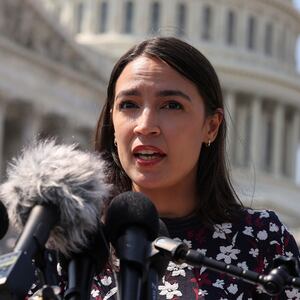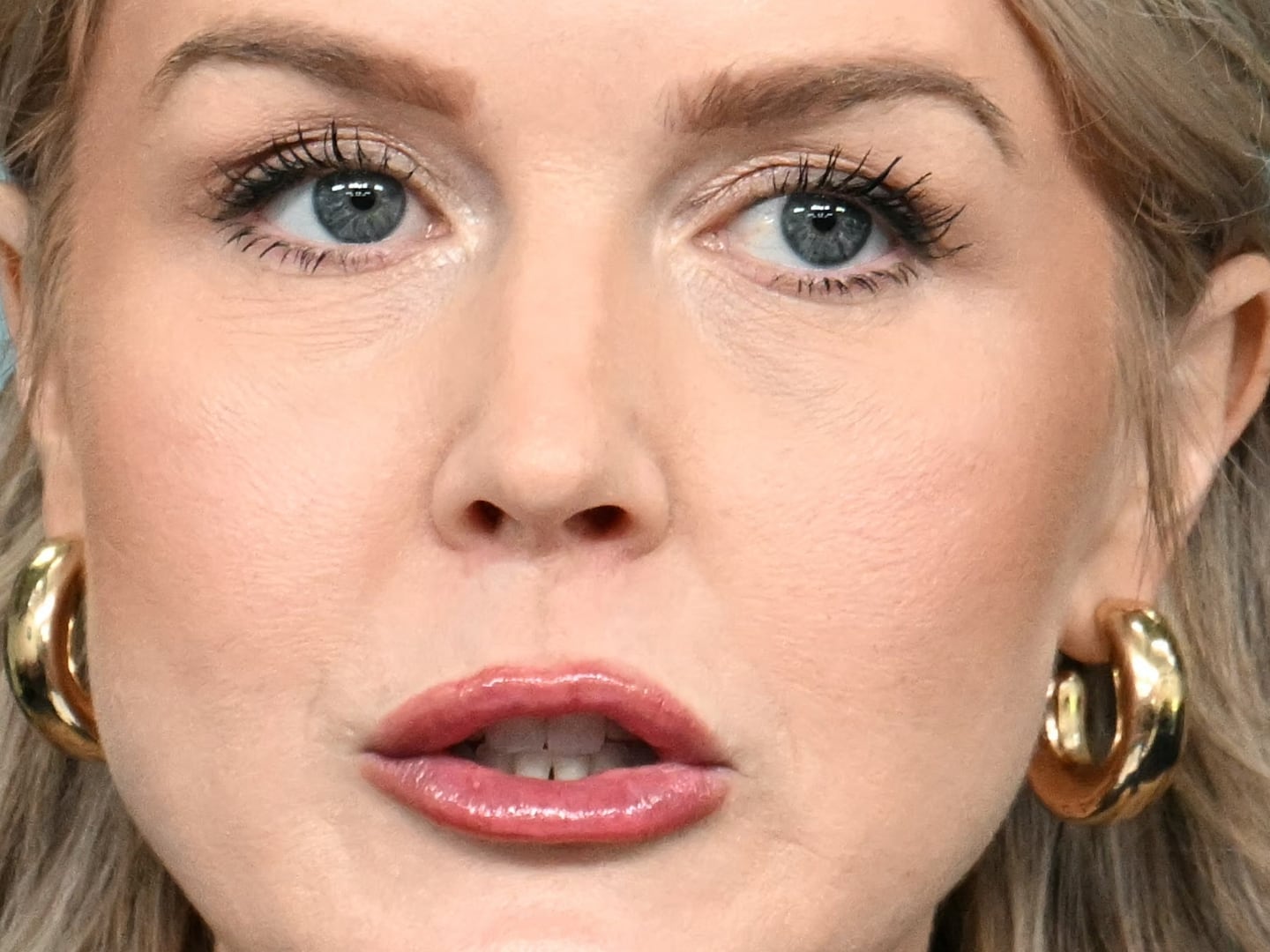Five years after a powerful House Democratic leader was toppled by an unknown Democratic socialist named Alexandria Ocasio-Cortez, the organized effort to elect more progressives has yielded the most left-wing crew of lawmakers ever to serve in Congress.
But today, the left isn’t looking at the 2024 election as another opportunity to grow their power; they’re looking at it as a potential electoral bloodbath.
One of the most powerful forces in U.S. politics—the American-Israel Public Affairs Committee, or AIPAC—is expected to unleash a historic deluge of money in 2024 to defeat left-wing incumbents in primaries. These members were some of the most vehement critics of Israel both before and during its war on Gaza, and AIPAC isn’t going to let them forget it.
According to Slate, the group could spend as much as $100 million, a figure AIPAC has neither confirmed nor denied.
In response to questions from The Daily Beast, AIPAC spokesman Marshall Wittman said the group is “in the process of evaluating races involving detractors of Israel, but we have not yet made any decisions.”
“Our sole criteria in evaluating candidates is their position on the U.S.-Israel alliance. We will not only oppose detractors but also strongly support champions of the U.S.-Israel relationship,” Wittman said, noting that the group has supported much of the House Democratic caucus, including “almost half” of the Congressional Progressive Caucus. (The group also backed dozens of Republicans who voted to overturn the 2020 election, a move that tarnished its brand in Washington.)
AIPAC is a singular player in today’s politics. It has a bipartisan veneer of respectability but a vast budget—supplied to a significant extent by wealthy conservatives—which is deployed for use in Democratic primaries to ensure the most unequivocal supporter of Israel wins. In 2022, AIPAC’s affiliated United Democracy Project PAC spent over $26 million, almost entirely in safe-seat Democratic primaries.
To Ocasio-Cortez, it’s that exact dynamic that makes her view AIPAC less as a threat to progressives and more as a threat to the Democratic Party itself.
“They take money from Republican donors, they pour it into Democratic primaries, they exclusively—virtually exclusively—target Democratic incumbents. And so my concern is less about the dilution of progressive power,” she told The Daily Beast during a brief interview in the Capitol.
“But what I have concerns about is the rupture that this could represent in the Democratic Party and the hostility that it could involve if our party does not stand together against some of the most disruptive tactics that we've seen,” she said.
At the top of AIPAC’s target list would be eight left-wing House Democrats loosely known as “the Squad,” a group that includes highly visible figures like Reps. Rashida Tlaib (D-MI), Ilhan Omar (D-MN), Jamaal Bowman (D-NY), Cori Bush (D-MO), and Ocasio-Cortez.
Some of them have already drawn credible primary challenges. For those who haven’t, Rep. Pramila Jayapal (D-WA), chair of the Congressional Progressive Caucus, told The Daily Beast that AIPAC is “actively recruiting in a number of districts.”

Rep. Alexandria Ocasio-Cortez (D-NY) speaks at a press conference outside the Capitol.
Kevin Wurm/ReutersWhile the Squad’s members are proven fundraisers with grassroots followings, they will need the party establishment and allied groups to offer up all the help they can get. Compounding the angst for progressives is that they’re not likely to get the level of aid they believe is needed to survive.
For one, the group most associated with the rise of the left in Congress—Justice Democrats, a political organization responsible for recruiting and electing the likes of Ocasio-Cortez and Bowman—has scaled back its operations this year.
Since 2018, Justice Democrats has established itself as a key outside electoral force on the left, spending millions of dollars through its political action committee to boost its candidates—making it only one of a few organizations on the left with the resources to compete in the realm of TV ads and other forms of communication.
But over the summer, the group hit a cash crunch and laid off half of its staff, raising questions about its ability to defend allied members from an AIPAC onslaught.
A big reason behind Justice Democrats’ contraction presents another cause for alarm among progressives. The group faced a challenge virtually all liberal grassroots organizations have this year: a massive drying-up of contributions across the board.
Democrats are increasingly concerned that the small-dollar online money machine won’t materialize to help them stop Donald Trump and to capture control of Congress. Against that high-stakes backdrop, progressive operatives understand that protecting left-wing incumbents won’t exactly be top-of-mind for most donors.
“We are genuinely dealing with the rise of fascism in America,” said Max Berger, a strategist who previously worked at Justice Democrats. “People aren’t worrying about what’s happening in super blue districts. I don’t think that’s insane.”
Money, of course, does not always equate to electoral success.
AIPAC and its allies have outspent progressives before and lost. But in 2024, left-wing incumbents will be outgunned by an even more disproportionate margin, while their few institutional allies struggle to stay afloat, much less invest in defending them, and the party base focuses its energies on the battle for the White House and Congress.
Taken together, it’s all enough to make progressives nervous not just about the coming election, but the future of a movement that was unquestionably on the rise just a few years ago.
“I can’t tell how bad it’s going to get in terms of setbacks and losses,” Berger said. “There are a few races that are going to be very close, or have reason to think will be challenging.”
Multiple progressives shared their dismay that a purge of younger lawmakers with unique appeal to key demographics of the party—because of their stances on Israel, an issue where most Democrats actually agree with them—could seriously set back not just the left wing but the entire party more generally.
“It’s going to deprive the Democratic Party of a generation of leaders who represent the interests of rising voters, which is dangerous for the future of the Democratic Party,” said Berger.
Usamah Andrabi, communications director for Justice Democrats, acknowledged the challenges facing their group and the broader left but told The Daily Beast they plan to mount a tough defense of their incumbents.
“Despite the fundraising difficulties that many campaigns and organizations that don’t rely on corporate donations have gone through this cycle, our entire coalition is all-in on defending our incumbents against the multimillion dollar attacks from Republican-funded Super PACs like AIPAC,” Andrabi said. (AIPAC has received significant support from GOP megadonors, such as Home Depot founder Bernie Marcus, a key Trump supporter.)
While progressives on Capitol Hill seem to be enjoying a better relationship with Democratic Leader Hakeem Jeffries (D-NY) than they did with his predecessor, Nancy Pelosi, they do not sound completely confident the party will fully protect their incumbents from primary threats.
Jeffries has long been one of AIPAC’s most enthusiastic allies in Congress, and the relationship between him and the party’s left wing has typically been chilly. But the Democratic leader has already lent his support for Squad incumbents facing threats in 2024; in August, he endorsed Omar as the primary threats first began to rumble.
When asked about AIPAC’s role at a press conference last month, Jeffries said outside groups are “going to do what outside groups are going to do.”
“House Democrats are going to continue to support each other,” he said.
Still, top progressives say Jeffries and his team can do more to proactively voice support for incumbents and, when the time comes, provide tangible campaign support.

Reps. Ilhan Omar (D-MN) and Pramila Jayapal (D-WA) lead a House Progressive Caucus news conference on Capitol Hill
Jonathan Ernst/ReutersJayapal said she and fellow CPC leaders have spoken multiple times with Jeffries and Rep. Suzan DelBene (D-WA), chair of the party’s House campaign arm, to impress upon them the need to “protect all incumbents.” While Jayapal said “they’ve been receptive,” she also had an ominous caveat: “It’s not all very public and it's not all very clear.”
“It's just a big waste of money for the Democratic Party,” Jayapal said of the AIPAC-fueled primaries. “It's a big problem and our leadership needs to strongly speak out on it, and publicly be clear.”
Ocasio-Cortez was more blunt, saying it would be “destabilizing” if Democratic leadership did not come to the defense of incumbents.
“These members are going to have to be defended by our party leadership, and they need to be defended as vociferously as incumbents that have been primaried from other elements of the party,” she said.
While there’s irony to Ocasio-Cortez’s statement—she herself knocked out an incumbent—it’s also true that she faced the brunt of the party establishment in that race, in a way that challengers to progressive incumbents typically have not.
But some progressives on the front lines are encouraged by the steps leadership has taken so far.
“Leader Jeffries was really clear when he was asked about that, and he said he’s going to support the incumbents,” said Rep. Bowman in an interview with The Daily Beast. “I take him at his word and I know he will do that, and I’ve had conversations with other members of leadership who said they’re going to do the same thing.”
With primaries on the horizon for spring and summer 2024, it’s clear that most of the Squad-aligned members are in for the toughest races of their careers.
In Minneapolis, Omar is facing a repeat challenge from Don Samuels, the Democrat who nearly defeated her in a surprising primary result last year. In St. Louis, Bush drew a legitimate opponent in Wesley Bell, the St. Louis Prosecuting Attorney and a former member of the city council in Ferguson. He had been running against Sen. Josh Hawley (R-MO) before deciding to challenge Bush instead.
Tlaib has not yet drawn a primary challenger, but according to Politico, AIPAC attempted to recruit actor Hill Harper—currently running for U.S. Senate in Michigan—in the race against her with a promise of $20 million in support. He refused, but it’s likely someone else steps forward.
Progressives agree that Bowman could end up with the toughest fight. A former high school principal from the Bronx, Bowman unseated longtime Rep. Eliot Engel in 2020, helped by $1 million in backing from Justice Democrats.
While his Westchester County-based district is deep blue, Bowman’s staunch criticism of Israel has put him at odds with the region’s considerable Jewish community. George Latimer, the Westchester County Executive, is weighing a run against Bowman and is reportedly being heavily recruited by pro-AIPAC forces.
The combination of a flood of cash, a high-profile opponent, and a campaign framed around Israel could prove seriously difficult for Bowman, but he said he wasn’t worried about any challenge when asked by The Daily Beast.
“If we’ve been doing the work in our districts, and we’ve had an impact on the lives of people, that speaks for itself,” he said. “We stand on the work we’ve done, and we stand on our values and the values of the district.”
A newer addition to the left flank in Congress, Rep. Summer Lee (D-PA), survived $4 million of AIPAC funds against her 2022 and may see a similar deluge again.
Through an allied group, AIPAC directed nearly $4 million against Lee, both in an open Democratic primary she narrowly won and in a general election, which she handily won against a conservative Republican. Justice Democrats went all-in on electing Lee, spending $1 million to boost her. A local city council member, Bhavini Patel, has announced a challenge to Lee.
At the start of November, AIPAC-funded ads began running, attacking Bowman and Lee in their districts, which Bowman lamented were “poisoning the minds of my constituents who support the good work that I’m doing.”
But progressives aren’t just facing the prospect that one or more of these incumbents lose. They’re also confronting the fact that their need to play defense in 2024 will preclude their ability to play offense.
On paper, this election cycle offers a tantalizing opportunity for the left. An unusually high number of safe Democratic seats are being left vacant by retiring incumbents. Increasingly, left-wing Democrats are getting to Congress not by primarying incumbents but by winning open seat races, like Lee and Rep. Greg Casar (D-TX) did last year.
But AIPAC is also a major player in open primaries. In 2022, it intervened in them to block several progressive candidates. Its affiliated PAC spent $4.2 million to help defeat former Rep. Donna Edwards (D-MD).
So far, 10 safe Democratic seats have opened up for 2024. Some are the deepest blue seats in the House; in six, Biden’s margin of victory in 2020 was over 45 percentage points. More are expected to open up as lawmakers in both parties head for the exits this year.
But given how stymied they will be in defending incumbents, progressives acknowledge that they will be hard-pressed to fully capitalize on a rare opportunity to grow their ranks.
“Candidate recruitment never really ends at JD, and as so many people are retiring, we’re looking and evaluating at all those seats as they open up as well as continuing to identify some of the worst corporate democrat incumbents to target,” said Andrabi, the Justice Democrats communications director.
“But when you have such an existential threat to the power you’ve already built, which AIPAC has created with its threat of $100 million in GOP mega donor funds, then you have to prioritize,” he said. “In order to expand power, we have to protect what we have built first and foremost.”
To be sure, there are bright spots in the left’s 2024 outlook. Progressives expect that donors motivated by their opposition to the war in Gaza will step up their contributions to the few Democratic politicians who reflect those views. And many believe that scrutiny of AIPAC and its role in primaries will finally reach a point in 2024 where the candidates it supports will have to answer for the group’s backing.
Even if 2024 turns out better for progressives than expected, however, some are already thinking about how high the cost could be just to survive.
“I have a lot of faith in our candidates and our incumbents, and I think that they will win,” said Jayapal. “But I think it is a terrible distraction and a waste of the money that we’re going to have to spend to defend our incumbents—instead of spending on making sure Trump doesn’t win and getting back our gavels.”









